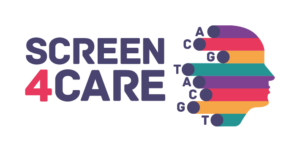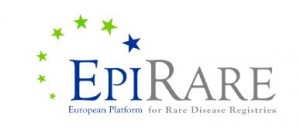Проекти
New EU Research Project “Screen4Care”: Accelerating Diagnosis for Rare Disease Patients Through Genetic Newborn Screening and Artificial Intelligence
 On 1 October 2021 an international public-private consortium of 35 partners announced the launch of Screen4Care – a research project that aims to significantly shorten the time required for rare disease diagnosis and efficient intervention by utilising genetic newborn screening and advanced analysis methods such as machine learning. Read the full article here.
On 1 October 2021 an international public-private consortium of 35 partners announced the launch of Screen4Care – a research project that aims to significantly shorten the time required for rare disease diagnosis and efficient intervention by utilising genetic newborn screening and advanced analysis methods such as machine learning. Read the full article here.
 This newsletter links you to summaries of progress and early findings, where these are available, covering investigations into: the prevalence of autism and its costs; early detection and improved training; effective support for autistic adults and senior citizens; and the development of EU-wide policies on autism. Click here to read the newsletter.
This newsletter links you to summaries of progress and early findings, where these are available, covering investigations into: the prevalence of autism and its costs; early detection and improved training; effective support for autistic adults and senior citizens; and the development of EU-wide policies on autism. Click here to read the newsletter.
Life with a rare disease brings lots of unknown and unexpected – long search for a diagnosis, more difficult access to treatment if there is any, lack of enough understanding of the condition by the medical experts and society, need to adapt to a totally different way of living, full with physical, financial and other restrictions. All of this is a heavy burden upon the psyche of the patients and their families and often leaves them confused and helpless how to cope with all the problems.
Striving to provide them with free psychological and social support, Bulgarian Huntington Association and National Alliance of People with Rare Diseases start the project “Psychosocial help at home for people with rare diseases” financed by “Social protection” Fund to Ministry of work and social politics.
From May to November 2015 psychologists and social workers will consult patients, living in Sofia in their homes.
To benefit from the social services of the project is needed a preliminary enrollment at:
info@huntington.bg, 0886 390679 – Bulgarian Huntington Association
or
tomov@raredis.org , 0888 323748 – National Alliance of People with Rare Diseases
 Understanding about autism will get a boost as universities, charities and expert institutions from 14 European countries come together in a major new programme. Autism Spectrum Disorders in Europe (ASDEU) has been funded by the European Commission to research autism diagnosis, prevalence and interventions and to improve care and support for people with autism. Autism Spectrum Disorders in Europe (ASDEU) is a three-year programme run by a consortium of 20 groups from 14 countries. ASDEU has received 2.1 million euros from the Directorate-General of Health and Consumers of the European Commission (DG-SANCO) to increase understanding of and improve responses to autism. BAPES is a member of the programme consortium. The project will officially begin on February 15th, 2015. You can read more about the project here.
Understanding about autism will get a boost as universities, charities and expert institutions from 14 European countries come together in a major new programme. Autism Spectrum Disorders in Europe (ASDEU) has been funded by the European Commission to research autism diagnosis, prevalence and interventions and to improve care and support for people with autism. Autism Spectrum Disorders in Europe (ASDEU) is a three-year programme run by a consortium of 20 groups from 14 countries. ASDEU has received 2.1 million euros from the Directorate-General of Health and Consumers of the European Commission (DG-SANCO) to increase understanding of and improve responses to autism. BAPES is a member of the programme consortium. The project will officially begin on February 15th, 2015. You can read more about the project here.
 An online questionnaire about best practices on Integrated Medical Records (IMR) with Narrative Based Information (NBM) is under conduction within the Story Telling on Record (S.T.o.Re) project. The survey is aimed at everyone who has experience of IMRs with NBM information – doctors, nurses, health authorities, patients. For more information or for completing the questionnaire, please visit the official S.T.o.Re project website.
An online questionnaire about best practices on Integrated Medical Records (IMR) with Narrative Based Information (NBM) is under conduction within the Story Telling on Record (S.T.o.Re) project. The survey is aimed at everyone who has experience of IMRs with NBM information – doctors, nurses, health authorities, patients. For more information or for completing the questionnaire, please visit the official S.T.o.Re project website.
 The 4th Partners meeting within the Story Telling on Record (S.T.o.Re.) project will be held from 17 to 18 October 2014 in Plovdiv. Organizer is the team of the Institute for Rare Diseases. Following the success of previous meetings in Turkey, Greece and Italy, the upcoming event will discuss the initiatives taken so far, the actions of the partners and next steps will be planned. For more information, please visit the official website of the project.
The 4th Partners meeting within the Story Telling on Record (S.T.o.Re.) project will be held from 17 to 18 October 2014 in Plovdiv. Organizer is the team of the Institute for Rare Diseases. Following the success of previous meetings in Turkey, Greece and Italy, the upcoming event will discuss the initiatives taken so far, the actions of the partners and next steps will be planned. For more information, please visit the official website of the project.
 The third International Workshop “Rare disease and orphan drug registries” will be hold from 24th to 25th November, 2014 in Rome, Italy. The event is organized within the EPIRARE project. Among the main topics are: the contribution of registration activities to recent advancements in the medical history, epidemiology and pathogenesis of rare diseases as well as patient care and quality of life; practical and innovative applications of registries; lessons learned in the management of rare diseases registries; the impact of e-health initiatives, new communication technologies and social networks. The deadline for the submission of abstracst is 12th October 2014. For more information, please visit the official EPIRARE website.
The third International Workshop “Rare disease and orphan drug registries” will be hold from 24th to 25th November, 2014 in Rome, Italy. The event is organized within the EPIRARE project. Among the main topics are: the contribution of registration activities to recent advancements in the medical history, epidemiology and pathogenesis of rare diseases as well as patient care and quality of life; practical and innovative applications of registries; lessons learned in the management of rare diseases registries; the impact of e-health initiatives, new communication technologies and social networks. The deadline for the submission of abstracst is 12th October 2014. For more information, please visit the official EPIRARE website.
![]() S.T.o.Re Project, funded by the EC, officially started in August 2013. It aims to understand to what extent and in what ways narrative-based medicine (NBM) can act as a complementary approach to evidence-based medicine (EBM). In particular, the project wants to promote the use of integrated health records, integration of narrative and traditional medicine, improving collaboration between doctors, patients and health authorities, improving the quality of medical services and the adequacy of therapy. Italian National Institute of Health (ISS) is the project coordinator and Information Centre for Rare Diseases and Orphan Drugs is an associate partner. For more information, please visit the official website of the project.
S.T.o.Re Project, funded by the EC, officially started in August 2013. It aims to understand to what extent and in what ways narrative-based medicine (NBM) can act as a complementary approach to evidence-based medicine (EBM). In particular, the project wants to promote the use of integrated health records, integration of narrative and traditional medicine, improving collaboration between doctors, patients and health authorities, improving the quality of medical services and the adequacy of therapy. Italian National Institute of Health (ISS) is the project coordinator and Information Centre for Rare Diseases and Orphan Drugs is an associate partner. For more information, please visit the official website of the project.


